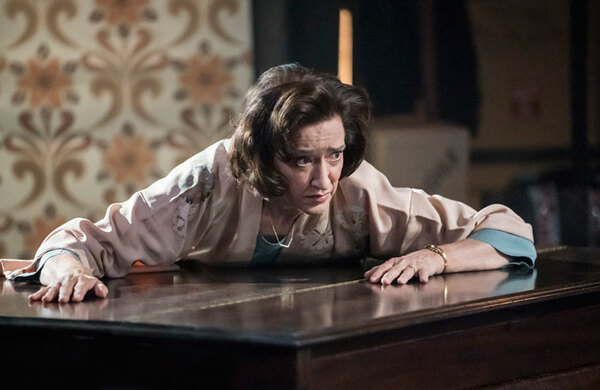An Enemy of the People












“Lunatic”, “insane”, “mad” – synonyms for crazy pop up regularly in Rebecca Lenkiewicz’s version of Henrik Ibsen’s An Enemy of the People. They’re used, most frequently, as a slur against Dr Teresa Stockmann (Alex Kingston), but the play itself is based around at least three different types of madness – none of which have anything to do with mental health.
There’s the basic stupidity of Mayor Peter Mattsson (Malcolm Sinclair) in conspiring to prioritise profit over the health of spa users. Then there’s the feverish irrationality of the town people’s mob justice for the apparent villain. And, to a lesser extent, there’s the foolishness inherent in Dr Stockmann’s zealous desire for martyrdom on the altar of free-thinking.
Adam Penford’s production intermittently places the cagoule-wearing brigade of angry town folk around the edge of the Stockmanns’ Scandi-chic living space. The Norweigan spa town of Skien is, as the staging suggests, somewhere you are constantly being watched and always on the verge of being condemned. The family’s Hygge home, elegantly designed by Morgan Large, remains a soft furnishings paradise only briefly.
In re-writing Dr Stockmann as a woman, Lenkiewicz swirls the sexism already experienced by the doctor into the bigger mix of her downfall. Kingston captures the exasperation of a woman who is constantly aware that people think of her as some kind of “mad scientist”, one who should be better controlled by her husband.
Her over-emphatic actions and declarative voice carry with them the long-running exhaustion of a woman who knows her choice to be both a mother and a medical professional makes her an object of suspicion prior to people voicing that accusation. Dr Stockmann is a woman desperate to make herself heard and trusted long before she’s drowned out by the mob and effectively exiled.
There are many other strong performances, in particular from Sinclair as the archetypical humourless politician. While everyone else is clothed in snuggly layers of needlecord and knitwear, the mayor wears his regimental suit like a second skin. Sinclair makes the character more sinister by downplaying his dictatorial qualities, as Dr Stockmann becomes more strident he gives the unnerving impression of calmness and balance.
Donna Banya as Petra, especially in her sweetly flirtatious interactions with Ulrika Hovstad (Emma Pallant), is also compelling throughout.
Lenkiewicz’s adaptation has obvious modern parallels, including a direct reference to ‘fake news’. It also pinpoints the flaws of all parties, creating overlaps with Robert Icke’s The Doctor. Stockmann, as a representative of the liberal elite, is shockingly reductive in her views on intelligence and class, dismissive of her cleaner and too quick to assume she’ll be the recipient of praise.
But the adaptation wears its allusions and references lightly. If Ibsen’s original is relevant now, then perhaps that’s because it always is.
Alex Kingston: ‘I don’t want to play King Lear – let’s create new heavy hitting roles for women’
More Reviews
More about this person
More about this organisation
More Reviews
Recommended for you
Most Read
Across The Stage this weekYour subscription helps ensure our journalism can continue
Invest in The Stage today with a subscription starting at just £7.99
















